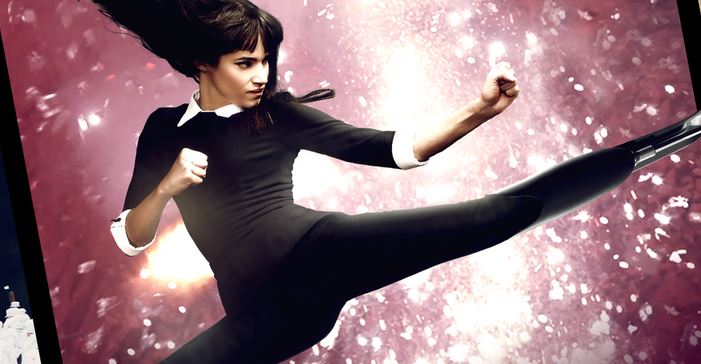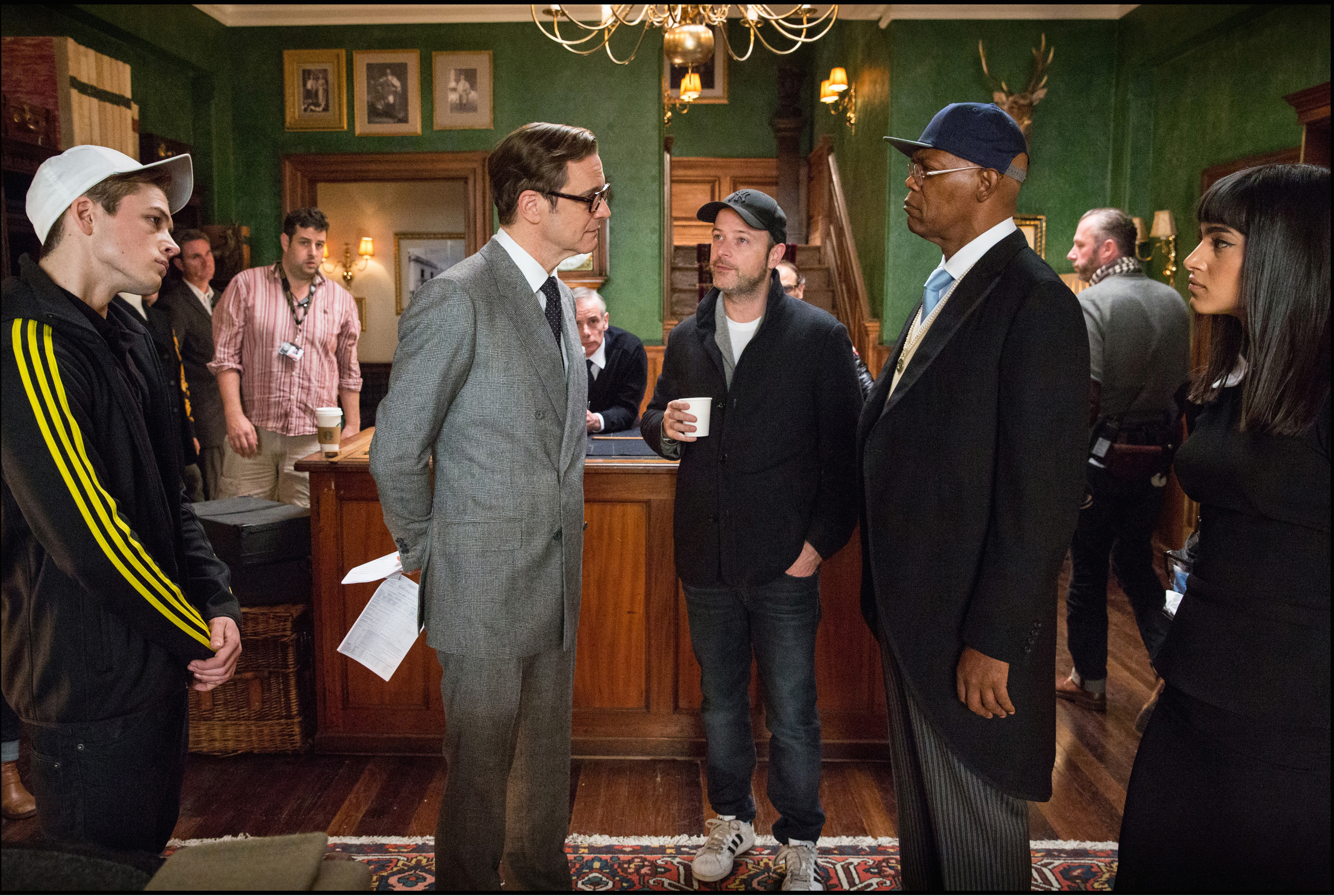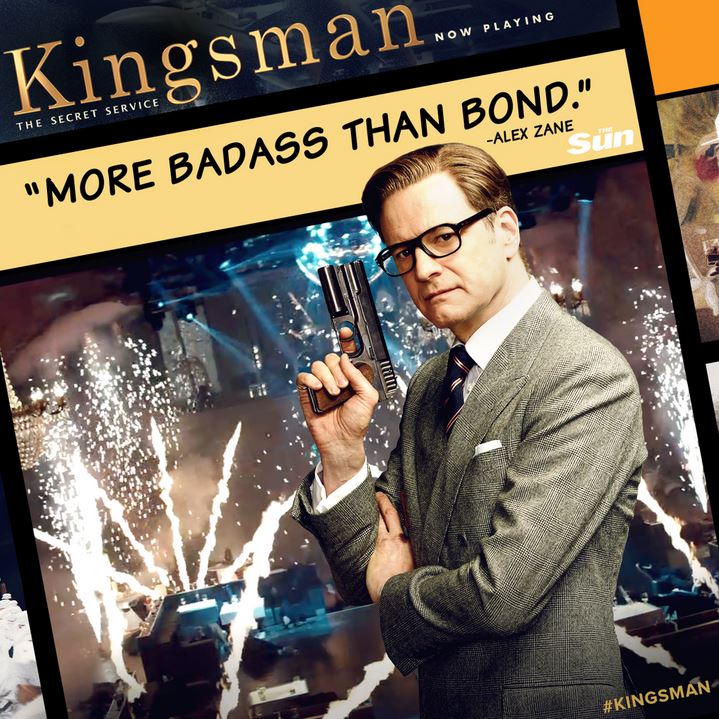Kingsman: The Secret Service comes as a surprise pleasure, albeit a pleasure hampered by specific reservations. I stress “surprise” here because the trailers lessened my expectations. Too much CGI, too much fight choreography, too much concern over creating a misappropriated mélange of genre clichés redistributed upon dreamy espionage teens. If competition to be a 00-agent took place at a Hogwarts/Ender’s Game-style recruitment facility.
Matthew Vaughn made that kinetic frenzy work in Kick-Ass, but a film derived from the spy genre rather than the action genre requires a different handling, a slightly greater concern for the relative grounded real rather than the surreal. Consider the differences between early Connery and Die Another Day to highlight the two Bond extremes. Spoof, homage or straight-take – each successful interpretation of the spy genre requires an approach grounded in real-world politics and real-ish consequences.
With that in mind, Vaughn’s spy enterprise succeeds more than it doesn’t. The novelty of Colin Firth laying the smackdown upon a clan of Cheapside barbarians or bigoted hate-churchers overflows with unexpected glee. But it’s in these sequences that Vaughn can’t resist the balletic nature of an airborne CGI tooth or severed limb that interrupts the fluid and otherwise impressive fisticuffs and umbrella parries, pulling us out of the moment and across the fourth wall.
Specific Reservation #1:
The film concerns itself with manners. “Manners maketh man,” Colin Firth says in his tutelage of young Eggsy. Manners and honor among these international agents becomes a foregrounded concept. The youth must learn to respect the social and moral codes of espionage through proper commitment to the institution, speech, dress and overall presentation. Why else would the front for this privately funded organization take the form of a Savile Row tailor? The tailors of Ian Fleming and James Bond. Indeed the unlearned and uncultured hooligan must first understand the ways of the world before daring to combat the world’s megalomaniacal evildoers.
I’m unsure, however, whether Vaughn noted the irony of creating a film that doesn’t itself follow this advice. His intention remains unclear. The film’s juvenile obsession with blood, uber-violence and especially the crass joke about anal sex that concludes the film suggests Vaughn wants this movie to have its civility and tell “butt stuff” jokes too.
Now don’t get me wrong. I enjoy a good, well-timed joke about butt stuff. And that part of me applauded the set-up while the other part of me cringed at the execution and last minute cheapening of our main character’s supposed graduation into the world of tweed, tuxedos and the up-and-up.
The joke plays directly off the sexiful, traditional Bond ending – Bond and a beautiful woman marooned in an escape pod, life raft or dinghy, embracing in pre-coital stimulus only to be interrupted by a message of congratulations from MI-6. That the final moment riffs on Bond’s casual, post-mission coitus highlights the specter of Bond that hovers over the whole production. The temptation to overcome, exceed, out-do. Bond never dared discuss butt stuff so let’s definitely go where Bond has never (publicly) gone before.
Specific Reservation #2.
Kingsman both denies and embraces Bond. It’s the repeated line, spoken first by Samuel L. Jackson’s villain – “This isn’t that kind of movie” – that causes me consternation. As a result it also throws the litany of Bond references into conflict with the statement that it’s not “that kind of movie” when it, well… absolutely is that kind of movie. The statement once again breaches the fourth wall. Does Vaughn dwell too much in the realm of the nudge nudge wink wink?
This leads me to a question with no certain answer. Can the spy genre ever excise Bond? In the case of overt seriousness like Tinker Tailor Soldier Spy the film must avoid the genre trappings to take the form of serious entertainment. But in a pure genre film, is it possible? Jason Bourne amplified gritty realism and fist-to-fist combat and become something other, but the film’s legacy will ultimately remain haunted by criticism and analysis comparing the films to James Bond. And then James Bond went and borrowed the very same gritty realism that elevated the Bourne series. The circle hath been completed.

In Kingsman, the “escape” from Bond merely provides an excuse to return with open arms and lover’s remorse. The villain does not boast a physical deformation, instead a linguist deformation. He has a speech impediment, wandering lisp as unpredictable as the scar on Donald Pleasance’s Blofeld. His henchwoman (played by Sophia Boutella) walks and razor-sharp prosthetic legs, recalling the menace and physical prowess of the best of Bond henchpersons. There’s also a lair, gadgets, gizmos and a slightly more active quartermaster.
Maybe Kingsman isn’t exactly that kind of movie, but The Kingsman certainly can’t help itself when it sees an opportunity to trump the traditions of James Bond. I’m not saying that Vaughn has to choose parody or sincerity – just that this film could have benefitted from a little consistency across its form and function. All that said, the average moviegoer isn’t going to care about these observations. The average moviegoer is going to return to one simple question: Does it entertain?





